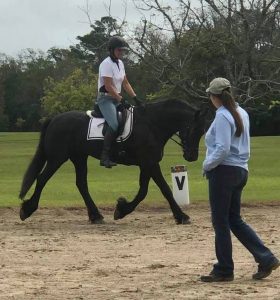
Amy watches a student
Editor’s Note: Amy Skinner is a regular guest columnist and has been a horse gal since age six. She will present an arena demonstration with fellow trainer and rider, Katrin Silva, at the Best Horse Practices Summit.
She rides and teaches dressage and Western. Skinner has studied at the Royal Andalusian School of Equestrian Art in Spain, with Buck Brannaman, Leslie Desmond, Brent Graef, and many others. Visit her site here.
Buy her book, To Catch a Horse: Finding the Heart of your Horsemanship here.
Read 5 Steps to Getting Back on Track, Amy’s follow-up to this article.
Amy writes:
Unfortunately, toxic trainer-student interactions are part of the horse world. These teachers tout themselves as experts and are often idolized. My colleague, Jec Ballou, calls the phenomenon ‘guru worship.’
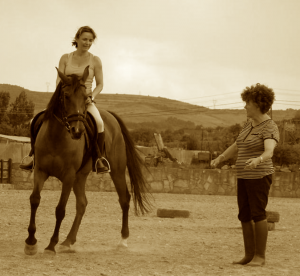 Sometimes people realize they experienced a toxic trainer after they’ve left, with their confidence shattered. Others don’t know they are in this type of relationship and explain or defend the trainer’s behavior.
Sometimes people realize they experienced a toxic trainer after they’ve left, with their confidence shattered. Others don’t know they are in this type of relationship and explain or defend the trainer’s behavior.
How do you know you have a toxic trainer?
Here are some signs:
1. They don’t allow or encourage questions.
A good trainer will encourage questions of all kinds. One who is confident in their work will not feel threatened by questions, and will be able to explain their motives, methods and choices. If asking why they chose to do something brings out an attack, or if asking about different methods makes them angry, you might have a toxic trainer.
2. They berate, insult, ignore, or flirt with you.
If your teacher puts you down, makes an example of you, or treats you inappropriately, it’s time to let them go.
3. They don’t listen when you talk. They interrupt you or seem to forget simple details about you or your horse, even after repeated lessons. They have mysterious amnesia and deny saying or doing bad things they did.
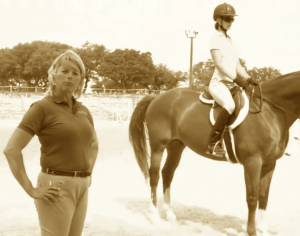 If you’ve been going to lessons week after week and they can’t remember basic details about you or your horse, it’s pretty clear they aren’t paying attention. One of the best teachers I’ve had can remember not only the details about my horse, but some of the jokes I made years back at the first clinic I attended. And I only see them once a year. This makes it clear to me, that they pay attention when I talk, and have an invested interest in my growth.
If you’ve been going to lessons week after week and they can’t remember basic details about you or your horse, it’s pretty clear they aren’t paying attention. One of the best teachers I’ve had can remember not only the details about my horse, but some of the jokes I made years back at the first clinic I attended. And I only see them once a year. This makes it clear to me, that they pay attention when I talk, and have an invested interest in my growth.
I don’t expect anyone to remember my horses’ name or even my name, but if I’ve been going frequently to lessons, I’d expect a good teacher to remember what we’ve worked on, where we are at in our progress, and other details.
If they steer you onto the wrong path and you mention that it didn’t work, or worse, that it got you hurt, and they deny ever having steered you that way, it’s time to leave. Toxic people don’t take responsibility or apologize.
4. You feel like you must have the right horse breed, tack, or clothes to be accepted.
If your teacher has disparaging things to say about your horse, your equipment, and makes you feel like you need to have what they have to be good, it might be time to reconsider.
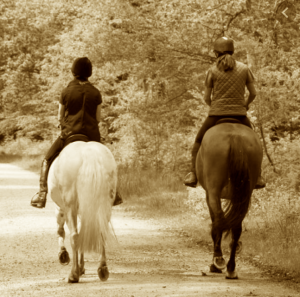 Personally, I’m drawn to certain breeds and I like certain tack, but I don’t expect my students to be clones of me. As long as their equipment fits, works well, and doesn’t cause pain, I like them to use whatever they like.
Personally, I’m drawn to certain breeds and I like certain tack, but I don’t expect my students to be clones of me. As long as their equipment fits, works well, and doesn’t cause pain, I like them to use whatever they like.
Although a small disclaimer: If you are seeking to be competitive in certain disciplines, some breeds are better at these jobs than others. If you just want a happy partnership, any horse can improve. If you want to go to the Olympics in dressage, a Tennessee Walker might not get you there (Although who am I to say that that horse couldn’t be fabulous?)
5. They don’t have anything good to say about your horse.
If they insult your horse, call them stupid, stubborn, untalented, please leave. Your horse is beyond their ability if they are insulting them. What you should really hear is: “I feel unconfident to help your horse.” You and your horse deserve better.
6. They lack empathy and behave poorly with people. This often gets explained away as “they’re bad with people but good with horses.” But when a trainer reveals how they are with people, it will ultimately come out with horses. They may not show it in public or all the time, but if they are mean to people, they have problems with empathy over all.
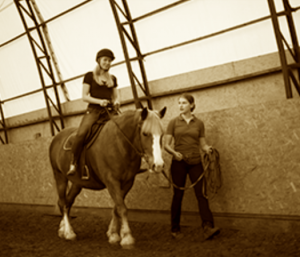 Another disclaimer: This is not the same as “awkward with people.” Some excellent horsemen and women have poor social skills, but they don’t lack empathy. They may put their foot in their mouth, may not be extra friendly, or may not have a great handle on social norms. They spend all their time around horses, so it isn’t entirely surprising.
Another disclaimer: This is not the same as “awkward with people.” Some excellent horsemen and women have poor social skills, but they don’t lack empathy. They may put their foot in their mouth, may not be extra friendly, or may not have a great handle on social norms. They spend all their time around horses, so it isn’t entirely surprising.
At a recent session, I asked why there were so many prominent narcissistic personalities enjoying success. My therapist replied: “Narcissism is basically the road map to success in America.”
Our culture values loud, showboating, and extroverted personalities. But when we do, everyone suffers. If your teachers have these tendencies, chances are, no matter how talented they may be, they will hurt your confidence and cause more harm than good.
Read 5 Steps to Getting Back on Track, Amy’s follow-up to this article.
so seen that berating at clinics. One example that stands out for me is when the clinician pair up people to do an activity, omitting some important details on how to ensure success. When almost everyone failed to execute the task he then went up one side and down the other on their lack of ability. I never went back to one of his clinics despite the guru status that some had given him. I was an auditor and sure wasn’t going to pay to have someone insult me.
ps I’ve seen one talented TW mare that was awesome dressage horse ridden by a very talented horsewoman, needless to say she could outwalk anyone else 🙂 But she also said she would put TW down instead of the breed because she knew that would bias people against what they were watching.
Very important materials for us all. Thanks for helping raise the bar.